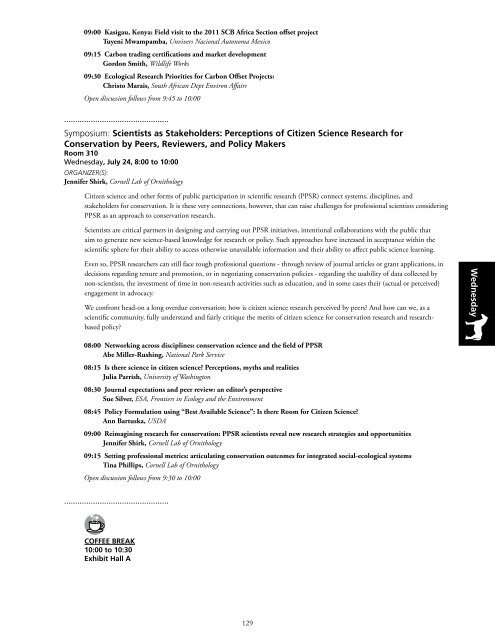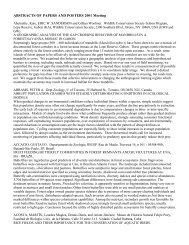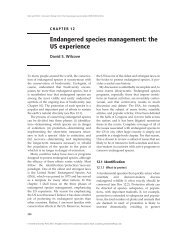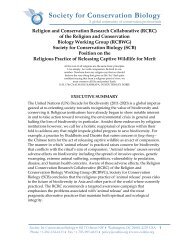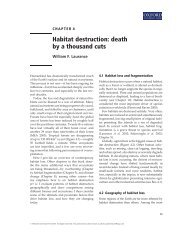ICCB 2013 Program - Society for Conservation Biology
ICCB 2013 Program - Society for Conservation Biology
ICCB 2013 Program - Society for Conservation Biology
You also want an ePaper? Increase the reach of your titles
YUMPU automatically turns print PDFs into web optimized ePapers that Google loves.
09:00 Kasigau, Kenya: Field visit to the 2011 SCB Africa Section offset project<br />
Tuyeni Mwampamba, Unvivers Nacional Autonoma Mexico<br />
09:15 Carbon trading certifications and market development<br />
Gordon Smith, Wildlife Works<br />
09:30 Ecological Research Priorities <strong>for</strong> Carbon Offset Projects:<br />
Christo Marais, South African Dept Environ Affairs<br />
Open discussion follows from 9:45 to 10:00<br />
...............................................<br />
Symposium: Scientists as Stakeholders: Perceptions of Citizen Science Research <strong>for</strong><br />
<strong>Conservation</strong> by Peers, Reviewers, and Policy Makers<br />
Room 310<br />
Wednesday, July 24, 8:00 to 10:00<br />
Organizer(s):<br />
Jennifer Shirk, Cornell Lab of Ornithology<br />
Citizen science and other <strong>for</strong>ms of public participation in scientific research (PPSR) connect systems, disciplines, and<br />
stakeholders <strong>for</strong> conservation. It is these very connections, however, that can raise challenges <strong>for</strong> professional scientists considering<br />
PPSR as an approach to conservation research.<br />
Scientists are critical partners in designing and carrying out PPSR initiatives, intentional collaborations with the public that<br />
aim to generate new science-based knowledge <strong>for</strong> research or policy. Such approaches have increased in acceptance within the<br />
scientific sphere <strong>for</strong> their ability to access otherwise unavailable in<strong>for</strong>mation and their ability to affect public science learning.<br />
Even so, PPSR researchers can still face tough professional questions - through review of journal articles or grant applications, in<br />
decisions regarding tenure and promotion, or in negotiating conservation policies - regarding the usability of data collected by<br />
non-scientists, the investment of time in non-research activities such as education, and in some cases their (actual or perceived)<br />
engagement in advocacy.<br />
We confront head-on a long overdue conversation: how is citizen science research perceived by peers And how can we, as a<br />
scientific community, fully understand and fairly critique the merits of citizen science <strong>for</strong> conservation research and researchbased<br />
policy<br />
Wednesday<br />
08:00 Networking across disciplines: conservation science and the field of PPSR<br />
Abe Miller-Rushing, National Park Service<br />
08:15 Is there science in citizen science Perceptions, myths and realities<br />
Julia Parrish, University of Washington<br />
08:30 Journal expectations and peer review: an editor’s perspective<br />
Sue Silver, ESA, Frontiers in Ecology and the Environment<br />
08:45 Policy Formulation using “Best Available Science”: Is there Room <strong>for</strong> Citizen Science<br />
Ann Bartuska, USDA<br />
09:00 Reimagining research <strong>for</strong> conservation: PPSR scientists reveal new research strategies and opportunities<br />
Jennifer Shirk, Cornell Lab of Ornithology<br />
09:15 Setting professional metrics: articulating conservation outcomes <strong>for</strong> integrated social-ecological systems<br />
Tina Phillips, Cornell Lab of Ornithology<br />
Open discussion follows from 9:30 to 10:00<br />
...............................................<br />
Coffee Break<br />
10:00 to 10:30<br />
Exhibit Hall A<br />
129


